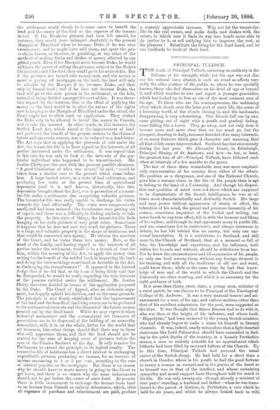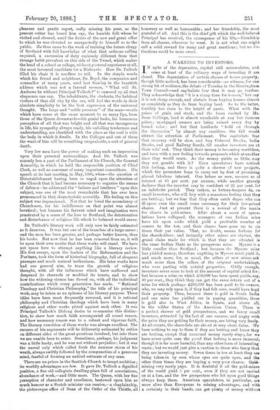PRINCIPAL TULLOCH.
THE death of Principal Tulloch, occurring so suddenly in the
fullness of his strength, while yet his eye was not dim nor his natural force abated, is such an event as affects very sadly the elder portion of the public to whom he was specially known, those who feel themselves on his level of age or beyond it, and which touches to awe and regret a younger generation which has looked up to him as one of the most eminent men of his age. To those who are his contemporaries, the saddening effect which clouds over the later part of every life, the sense of a lessening world, of the clouds closing in, and the landmarks disappearing, is very solemnising. Our friends fall one by one, some gliding out of sight with a gentle and gradual fading, some falling like a tower. They go away, and not only does it become more and more clear that we too must go, but the prospect, drawing in daily, becomes denuded of so many interests, of so many features which gave it character and meaning, that all that is left seems impoverished. Scotland has lost enormously daring the last year. Sir Alexander Grant, in Edinburgh, Principal Shairp, of St. Andrews, and now—to her, at least, the greatest loss of all—Principal Tulloch, have followed each other at intervals of a few months to the grave.
The last of these three remarkable men was more emphati- cally representative of his country than either of the others. His position as a clergyman, and one of the National Church, gave him a warmer share in the life of the people than is apt to belong to the head of a University. And though his disposi- tion and qualities of mind were not those which are supposed to be characteristic of the Scotch intelligence, he was at all times most characteristically and distinctly Scotch. His large and easy power without appearance of strain or effort, the toleration of his mind, the genial and generous humanity of his nature, sometimes impatient of the foolish and trifling, but never harsh to any true effort, fell in with the humour and liking of his nation ; and though he had opponents many in public life, and was sometimes hot in controversy, and always strenuous in debate, he has left behind him no enemy, but only one uni- versal lamentation. It is a misfortune to Scotland, and still more to the Church of Scotland, that at a moment so full of fate, his knowledge and experience, and his influence, both within her bounds and without, should be withdrawn from her. For he knew the circumstances and idiosyncrasies of his people, as only one bred among them, without any foreign element in his training, and with all the traditions of old use and wont, could know them; while at the same time he had that know- ledge of men and of the world in which the Church and the University are often wanting, and which is so necessary for the right guidance of both.
It is more than thirty, years since, a young man, minister of a rural parish, he was chosen to be Principal of the Theological College of St. Andrews. It was a very unusual honour and ad- vancement for a man of his age, and various motives, other than that of his excellent adaptation for the post, were suggested at the time. It was thought that Baron Bunsen had to do with it, who was then at the height of his influence, and whose book, "Hippolytus," had been reviewed by the young Scotch minister, who had already begun to make a name for himself in literary channels. It was, indeed, nearly miraculous that a light-hearted statesman like Lord Palmerston should have succeeded in find- ing in the quiet depths of the country, in a homely Perthshire manse, a man so entirely suitable for an appointment which hitherto had been filled by reverend fathers of the Church. Up to this time, Principal Tulloch had pursued the usual career of the Scotch clergy. He had held for a short time a church in Dundee, where in his youth he had the good fortune to marry a woman as exceptional in the genius of the heart as he himself was in that of the intellect, and whose sustaining sympathy and moral support have throughout told for much in his life. He was only twenty-six—though already a minister of four years' standing, a husband and father—when he was trans- ferred to the parish of Kettins, in Perthshire, a cure which he held for six years, and which he always looked back to with
pleasure and gentle regret, sadly missing his poor, as the present writer has heard him say, the humble folk whom he visited and cheered, amid the duties of the new and great office to which he was elevated as unexpectedly to himself as to the public. He thus came to the work of training the future clergy of Scotland with full knowledge of what that arduous calling required, a succession of duty curiously different from that strange habit prevalent on this side of the Tweed, which makes the head of a school or college, without pastoral experience at all, the most favoured candidate for a Bishopric. How Dr. Tulloch filled his chair it is needless to tell. In the simple words which his friend and neighbour, Dr. Boyd, the companion and counsellor of many years, used last Sunday in the heartfelt address which was not a funeral sermon, "What will St. Andrews be without Principal Tulloch ?" is summed up all that eloquence can say. The inhabitants, the students, the habitual visitors of that old city by the sea, will feel the words in their absolute simplicity to be the best expression of the universal thought. The large and "noble presence" of the man—words which have come at the same moment to so many lips, from those of the Queen downwards—his genial looks, his humorous perception of all that was bright and all that was incongruous in life, his sympathy always ready, his unfailing tenderness and understanding, are identified with the place as the soul is with the body in which it dwells. In the Colleges and out of them the want of him will be something unspeakable, a sort of general death.
Very few men have the power of making such an impression upon their personal surroundings. And Dr. Tulloch was scarcely less a part of the Parliament of his Church, the General Assembly, in which he held the responsible position of Chief Clerk, as well as convener of many important committees. His speech at its last meeting, in May, 1885, when—the question of Disestablishment having been so urged upon the attention of the Church that it had become necessary to organise the means of defence—he addressed the "fathers and brethren" upon this subject, was one of the most remarkable that has ever been pronounced in that characteristic assembly. His feeling on this subject was impassioned. Not that he loved the ascendency of Churchmen, for his indifference on that point was almost heretical ; but because his fervent mind and imagination were penetrated by a sense of the loss to Scotland, the deterioration and disturbance of religious life which he believed would ensue.
Dr. Tulloch's literary work will only now be fairly estimated as it deserves. It was but one of the branches of a large career ; and the man has been greater, and perhaps better known, than his books. But now that he has been removed from us, it will be upon their own merits that these works will stand. We have not space here to attempt anything like a literary review. His first essays, upon the leaders of the Reformation and the Puritans, took the form of historical biography, full of eloquent passages and much natural 'enthusiasm. His later works have had one general aim, to trace the growth of religious thought, with all the influences which have mellowed and deepened its channels or modified its tenets, and to show how the widening stream has flowed on, with all the individual contributions which every generation has made. "Rational Theology and Christian Philosophy," the title of his principal work, may be taken as an epitome of his literary purpose. These titles have been most frequently reversed, and it is rational philosophy and Christian theology which have been in many religious and other works pitted against each other. It was Principal Tulloch's lifelong desire to re-examine this distinc- tion, to show how much faith accompanied all sound reason, and how necessary reason was to a robust and vigorous faith, The literary execution of these works was always excellent. The success of his arguments will be differently estimated by critics on different sides of the great questions involved, but into these we are unable here to enter. Sometimes, perhaps, his judgment was a little hasty, and he was not without prejudice ; but it was the unreal only which called forth the summer storm of his wrath, always swiftly followed by the compunction of a generous mind, fearful of forming an unkind estimate of any man.
There are no prizes in the Scottish Church to tempt ambition ; its worldly advantages are few. It gave Dr. Tulloch a dignified position, a fine old collegiate dwelling-place full of associations, abundance of work,—and little more. The Queen, with her fine perception of character and excellence, bestowed upon him as much honour as a Scotch minister can receive,—a chaplainship, the picturesque office of Dean of the Order of the Thistle, all
honorary as well as honourable ; and her friendship, the most grateful of all. And this is the chief gift which the well-beloved. Principal has received, the recompense of his life,—friendship from all classes, wherever he went. It is not what one might call a solid reward for many and great exertions ; but no dis- tinctions could be more sweet.



































 Previous page
Previous page